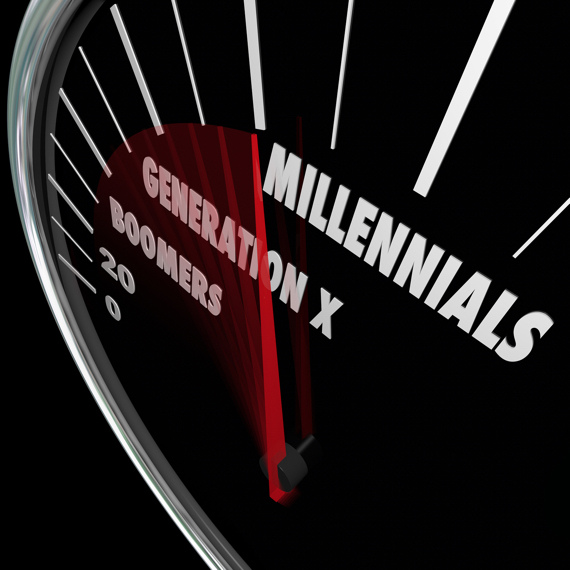There's no dearth of information about the workplace generational divide--in fact, you've no doubt seen countless articles, blog posts, whitepapers, and case studies about how millennials are 'taking over' or altering the American workplace. While there's some truth to that, there are many myths as well.
Among the myths: Millennials need constant attention, lack decorum, and don't seem to to know how to navigate basic tasks.
There's no question that a generation 80 million strong will make an impact on work culture, and marketers are paying close attention to them because they will control a vast portion of American wealth in the future.
While it's true that to create a productive work environment we need to separate the myth from the reality, there are indications that the generational divide isn't as vast as many of the experts would have us believe.
Do Boomers and Millennials have real workplace issues? Are GenX'ers struggling with both older and younger co-workers and employees?
And are there really generational tendencies that create a division between younger and older workers, or, has the impact of the Millennial mindset (the embrace of technology and new communications styles) meant that we are all more similar than we are different?
Let's explore the modern workplace and address the real issues, and talk about how to navigate between and across the generations.
The workplace continues to change
In 2013, I wrote a post for Forbes that included five ways leaders could bridge the generational divide. The piece looked at how companies could foster communication and increase flexibility via Digital Skill Levels. Now fast forward two short years, and there've been some major changes in how we view Millennials.
At the start of 2015, Pew Research released a report on how Millennials surpassed GenX as the largest generation in the workforce. And for the first time in history we will have a workforce comprised of four generations as Boomers work longer, and GenZ begins to enter the workforce.
And although marketers and bloggers are still obsessing over millennials, we're seeing a shift that addresses not just a demographic, but a mindset. As older generations continue to adapt to the technology and communication style of this generation, it's revealed what is called a "Millennial Mindset."
Yet, for every positive post that praises the virtues of Millennials, there is one reinforcing the negative stereotypes that have plagued this generation since entering the workforce and there is no question that general rifts between the generations carry over to the workplace.
Where are the real gaps between the generations?
One source of insight comes from the team at marketing and research agency ARCOMPANY. They created a series of generational "think tanks" exploring the multi-generational workplace, first with each generation separately, and then with a blended panel.
The research focused on presenting prevailing myths as well as current research to a panel comprised of six to eight members of each generation.
Among the similarities and differences that the think tanks revealed:
- All three generations prefer communicating face-to-face for important issues. Telephone was next, then email, and in very last place, text. Millennials made it clear that they detest work related texting.
So, how do we overcome the real, existing tensions?
Although the environment has changed, many of the approaches recommended in my Forbes article from a couple years ago are still applicable, in particular clear, open communication and flexibility with different skill levels.
Structured mentoring programs. Many Millennials have expressed a strong desire for better mentorship. Doing so can help foster communication between the generations and work in both directions. Think of modern mentoring as more of a two-way street, with generations learning from each other rather than the younger sitting at the feet of the older.
Discourage generation bashing. As much as you may be sick of hearing about Millennials, they're pretty sick of it themselves. Too many workplaces allow or even enable generalized talk about Millennials, which is not only against most HR policies and a form of ageism, but deeply destructive to a positive work environment. And in the end, will cost you productivity and profitability.
If employees express a negative view about generations, open an honest dialog; the reality is that most office relationship issues are interpersonal, not generational. Leading by example and creating open lines of communication goes a long way to clearing generational tensions.
